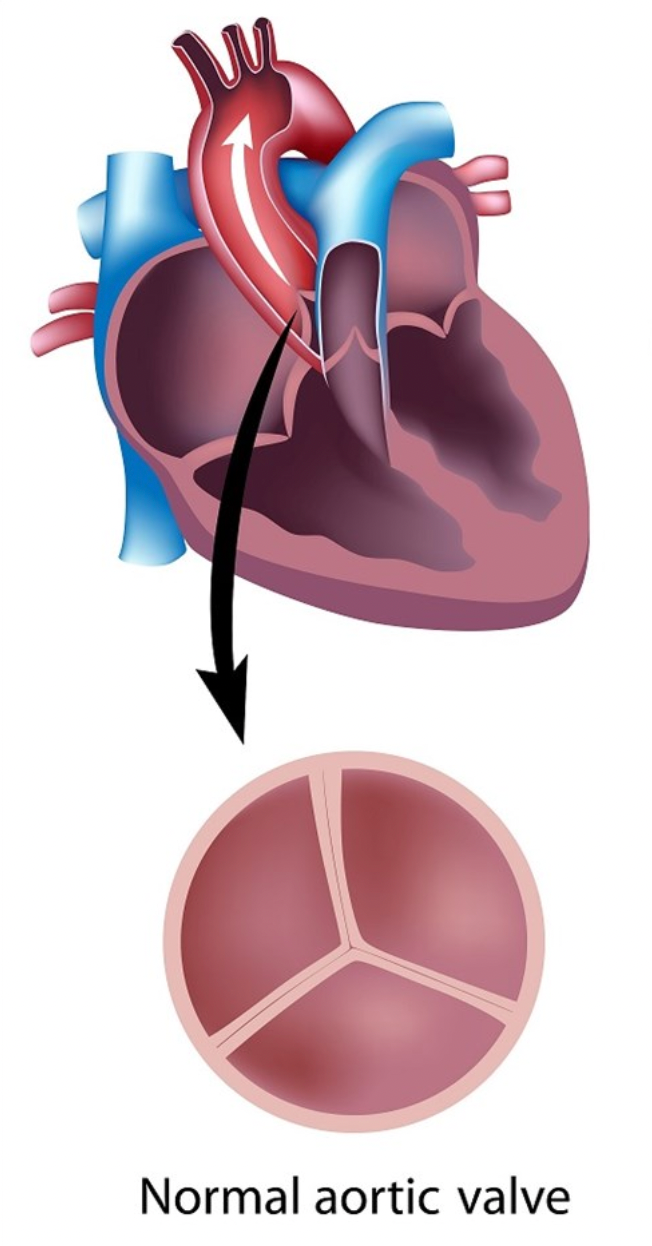Aortic Valve Disease
- siths375
- Sep 16, 2024
- 3 min read
Hello friends and welcome back to another day of Aorta Ed as part of #AorticDiseaseAwareness month! We have been showing the aorta a lot of love this campaign but one thing we have yet to touch on in-depth is the beloved aortic valve!
The aortic valve is the gatekeeper between the heart and the rest of the body. It is the final valve that opens before blood enters the aorta.
Most “normal” aortic valves are “tri-leaflet” in structure, like the famous “Mercedes-Benz” logo. With each heartbeat, the three leaflets of the aortic valve should open together in unison to allow blood to leave the heart and then tightly seal together to prevent blood from leaking back.
Aortic Stenosis
Aortic Stenosis refers to an aortic valve that is too tight. Over time as we age, several deposits of calcium, fats, and cholesterol can build up over the leaflets of the aortic valve causing it to harden and lose its ability to maximally expand. As a result, the pressure needed by the heart walls to pump through a small opening increases, and the heart must work harder with each beat to force blood into your aorta.
Symptoms include shortness of breath, unexplained tiredness, and in severe cases dizziness or fainting with heavy activity. This dizziness usually occurs due to decreased blood reaching your brain from the tightness.
Risk factors for aortic stenosis include things such as old age, high body fat, elevated cholesterol, genetics, and smoking.
Aortic Regurgitation
Aortic regurgitation is the opposite problem. The problem is that the valve is not tight enough, allowing blood to leak backward into the heart with each beat due to an inadequate seal between the leaflets.
In a normal heart, blood should always flow in the same direction after leaving the aorta. In patients with aortic regurgitation, as blood is pumped out into the aorta, some blood flows back into the left ventricle as blood is pumped out of the aorta.
While the heart can compensate for this in the short term by beating harder to pump that extra volume, over time this will exhaust the walls of the heart, causing it to dilate and weaken.
Symptoms of aortic regurgitation are similar to aortic stenosis and include things such as shortness of breath, tiredness, and fatigue, especially with physical activity. Risk factors for aortic regurgitation also include old age and things like prior infections of the aortic valve and connective tissue disorders.
Bicuspid Aortic Valve
It is estimated that nearly 1-2% of the world’s population have bicuspid aortic valves. Patients with bicuspid aortic valve usually develop aortic stenosis and or aortic regurgitation much younger in life than normally expected (40s to 60s instead of 70s to 80s) due to earlier deteroriation of their leaflets.
In addition to an elevated risk of premature valvular stenosis or regurgitation, there is some research to suggest that patients with bicuspid aortic valves have an elevated risk of developing weakness in the aortic root and walls, leading to an increased risk for ascending aortic aneurysms and/or thoracic aortic dissections over time.
Diagnosis
Once valve disease is suspected, your doctor will order a test called an “echocardiography,” which is an ultrasound of the heart.
An echocardiography will give your doctor lots of valuable information, including a visual representation of how strong the heart muscles are contracting, the flow of blood, as well as detailed pressure and volume measurements in each heart chamber, which can be used to grade how “severe” aortic stenosis or regurgitation is.
While mild and moderate disease may be monitored over time with repeat echocardiography and controlling risk factors such as high blood pressure and smoking, once the threshold for severe aortic stenosis or regurgitation is met, the only treatment known to prolong life expectancy and improve symptoms is aortic valve replacement.
And that's it for today! We will see you all soon for another day of Aorta Ed!
Thank you and #ThinkAorta!
Adham






Comments